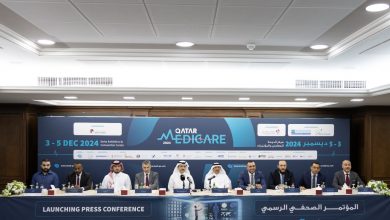Fasting with Diabetes, Heart and Kidney Disease Depends on the Doctor’s Assessment of the Patient’s State of Health
صيام مرضى السكري والقلب والكلى يعتمد على تقييم الطبيب لحالة المريض الصحية
QNA
Doha: With the beginning of the holy month of Ramadan, people with chronic diseases such as diabetes, kidney failure, and heart disease, have several questions about their ability to fast. Consultants from Hamad Medical Corporation (HMC) assert that determining the patient’s suitability for fasting depends on the assessment of the patient’s state of health by the attending physician.
In this framework, Chief Quality Officer, Deputy Chief Medical Officer at HMC Professor Abdul Badi Abou Samra, advises that patients should consult the attending physician before they start fasting in order to adjust the level of blood sugar and avoid any complications during the fasting period. The decision of the attending physician to fasting depends on the nature of the diabetes patient’s condition.
According to professor Abou Samra, to Qatar News Agency (QNA), type 1 diabetes patients dependent on insulin treatment as well as pregnant women with diabetes are advised not to fast in order to avoid serious complications. However, type 2 diabetes patients who do not have heart and kidney complications can fast with some precautions, including reviewing the attending physician well before the beginning of Ramadan to regulate blood sugar rates, reviewing the doses of the medication and regulating their times in proportion to the fasting hours. It is also preferable to delay Suhoor meal as much as possible, and to drink more water between Suhoor and Iftar to avoid dehydration.
Furthermore, In order to fast safely for diabetes patients, Professor Abou Samra stresses the need to maintain sugar levels within the patient’s safe rate of 80-180 mg/dl after breakfast, and to consistently eat Suhoor and Iftar meals, however delay Suhoor as much as possible while drinking as much water between iftar and Suhoor to protect the kidneys from exposure to drought and poor performance. Also, stimulants such as tea, coffee and soft drinks must also be reduced as they contain diuretic caffeine, which exposes those fasting to the loss of large amounts of liquids. In addition to postponing post-iftar exercise in order to avoid seizures of low blood sugar, and attending the mosque is also part of the daily physical and sporting activity allowed for patients during Ramadan.
It is necessary to ensure that blood sugar is checked several times a day, especially in the early days of fasting, as well as anytime the patient feels low blood sugar, even while avoiding sleep in the last hours of fasting, it is also preferable to see a doctor or diabetes intellectual several times during Ramadan to make the necessary adjustments in diabetes medications or any other medications taken by the patient.
For kidney patients,Senior Consultant and Head of HMCs Nephrology Department, Dr Hassan Al Malki, classifies kidney patients who wish to fast Ramadan into three categories according to the degree of illness in order to ensure their safety from complications.
Dr. Al Malki stated to Qatar News Agency (QNA), For acute renal deficiency patients, their health condition is critical. and they are prohibited from fasting until the kidney condition improves and returns to normal, Chronic kidney patients have different stages of nephropathy, and those with third-degree kidney disease and above are advised not to fast. This is because the kidneys at this stage are unable to retain body fluids kidney damage, which can cause severe deficiencies in their functions, and may cause significant kidney damage as well as prolonged fasting significantly decreases body fluids, patients should refer to the attending physician to see the extent of kidney injury and the impact of fasting on them.
Patients who are undergoing hemodialysis to treat kidney failure will typically receive the treatment three times a week and cannot fast due to IV fluid intake during the procedure; however, patients can normally fast during days they are not receiving hemodialysis.. As for peritoneal washing patients (abdominoplasty) performed by the patient himself at home, they cannot fast for the presence of substances fed with washing fluid.
Kidney transplant patients are advised not to fast due to the effect of low fluid on the transplanted kidneys and the need to take medication on a regular and timely basis, as well as the most diabetic transplant patients, which increases the risk of fasting on the patient, so he must consult his attending physician on an ongoing basis.
Regarding the ability of cardiac patients to fast, Senior Consultant Cardiologist and Head of the Cardiology Department at Al Khor Hospital and Associate Professor at Qatar University College of Medicine, Dr Amar Salam,asserts that the incidence of various heart diseases such as cardiac crisis (clot), cardiac failure, irregular heart (atrial tremor) decrease during Ramadan, cardiac failure and atrial trembling resulting from coronary artery failure are lower, and Ramadan fasting also increases beneficial cholesterol by 30-40 percent, which in turn protects heart arteries from LDL cholesterol deposits.
Research has shown that fasting and its accompanying religious rites lead to self tranquility and lowers excitement of the parasympathetic nervous system, resulting in lower pressure and heartbeat, which are good medical signals for most heart patients.
Dr. Amar Salam told Qatar News Agency (QNA), that the attending physician should be consulted several weeks before fasting begins, especially for patients with acute arterial deficiencies to adjust the dates of taking the medication and receive the necessary instructions to avoid any symptoms such as the sense of headache during fasting, By reducing your tea, coffee and other caffeinated drinks to five days before fasting special foods containing high sugars and fatty substances during the month of Ramadan.
For cardiac patients to take the drug during Ramadan, Dr. Amar Salam indicates that the patient can take the drug once again at iftar and again at Suhoor, and for patients who take their medication three times a day, they have to see the competent doctor to replace it with a long-acting medication taken once or twice a day.
قنا
الدوحة: مع بداية شهر رمضان الكريم تتوارد لدى أصحاب الأمراض المزمنة مثل “السكري والكلى والقلب”، العديد من الأسئلة عن مدى قدرتهم على الصيام، حيث يؤكد أطباء استشاريون من مؤسسة حمد الطبية أن تحديد ملاءمة المريض للصوم أو الإفطار يعتمد على تقييم حالة المريض الصحية من جانب الطبيب المعالج.
وفي هذا الإطار، ينصح البروفيسور عبد البديع أبو سمرة الرئيس التنفيذي للجودة بمؤسسة حمد الطبية ونائب الرئيس الطبي مرضى السكري، بضرورة استشارة الطبيب المعالج قبل البدء في الصيام من أجل ضبط مستوى السكر في الدم وتجنبا لحدوث أي مضاعفات أثناء فترة الصوم، حيث يعتمد قرار الطبيب المعالج بالصوم من عدمه وفقا لطبيعة حالة مريض السكري.
وقال البروفيسور أبو سمرة، لوكالة الأنباء القطرية /قنا/، إن مرضى السكري من النوع الأول المعتمد علاجهم على الأنسولين وكذلك النساء الحوامل المصابات بالسكري ننصحهم بعدم الصيام تجنبا لحدوث مضاعفات خطيرة، أما مرضى النوع الثاني من السكري الذين ليس لديهم مضاعفات بالقلب ومضاعفات بالكلى فبإمكانهم الصيام مع اتخاذ بعض الاحتياطات منها مراجعة الطبيب المعالج قبل بداية شهر رمضان بوقت كاف لتنظيم معدلات السكر بالدم ومراجعة جرعات الدواء وتنظيم أوقاتها بما يتناسب مع ساعات الصيام، كما يفضل تأخير وجبة السحور قدر الإمكان، والإكثار من شرب الماء بين وجبتي السحور والإفطار لتجنب الإصابة بالجفاف.
ومن أجل صيام آمن لمرضى السكري، يؤكد البروفيسور أبو سمرة على ضرورة الحفاظ على نسبة السكر ضمن المعدل الآمن للشخص المريض من 80- 180 مجم/دسل بعد الإفطار، والالتزام بتناول وجبتي السحور والإفطار، وتأخير السحور قدر المستطاع مع تناول أكبر قدر من المياه بين وجبتي الإفطار والسحور لحماية الكليتين من التعرض للجفاف وضعف الأداء، ويجب أيضا التقليل من تناول المنبهات كالشاي والقهوة والمشروبات الغازية نظرا لاحتوائها على مادة الكافيين المدرة للبول مما يعرض الصائم لفقدان كميات كبيرة من السوائل، بالإضافة إلى تأجيل ممارسة الرياضة لما بعد الإفطار تجنبا لحدوث نوبات انخفاض السكر بالدم، كما أن الذهاب إلى المسجد يعد جزءا من النشاط البدني والرياضي المسموح يوميا للمرضى خلال شهر رمضان.
ومن الضروري التأكد من فحص نسبة السكر في الدم عدة مرات في اليوم خاصة في الأيام الأولى من الصيام وكذلك في أي وقت يشعر فيه المريض بانخفاض معدل السكر في الدم، مع تجنب النوم في الساعات الأخيرة من الصيام، كما يفضل مراجعة الطبيب أو مثقف السكري عدة مرات خلال شهر رمضان لإجراء التعديلات الضرورية في أدوية السكرى أو أي أدوية أخرى يتناولها المريض.
أما مرضى الكلى، فيصنف الدكتور حسن المالكي استشاري أول ورئيس قسم أمراض الكلى بمؤسسة حمد الطبية، مرضى الكلى الذين يرغبون في صيام رمضان إلى ثلاثة أقسام بحسب درجة المرض حرصا على سلامتهم من حدوث مضاعفات.
ويقول الدكتور المالكي، في تصريح مماثل لوكالة الأبناء القطرية /قنا/، إنه بالنسبة لمرضى القصور الكلوي الحاد تكون حالتهم الصحية حرجة، وهم ممنوعون من الصيام إلى أن تتحسن حالة الكلى وتعود إلى وضعها الطبيعي، أما مرضى الكلى المزمن فتختلف مراحل اعتلال الكلى لديهم، وينصح المصابين بمرض الكلى من الدرجة الثالثة فما فوق بعدم الصيام، وذلك لأن الكلى في هذه المرحلة تكون غير قادرة على الاحتفاظ بسوائل الجسم، مما قد يتسبب في قصور حاد في وظائفها، وقد يؤدي ذلك إلى تلف الكلى بصورة كبيرة، وكذلك فالصيام لمدة طويلة ينقص سوائل الجسم بصورة كبيرة، ويجب على المرضى الرجوع للطبيب المعالج لمعرفة مدى إصابة الكلى وتأثير الصيام عليها.
أما مرضى الغسيل الكلوي، فيوضح أن مرضى الغسيل الدموي يقومون بغسيل الدم ثلاثة أيام في الأسبوع، وبالتالي فيمكنهم الصيام في باقي الأيام، حيث إن عملية الغسيل يصاحبها إعطاء محاليل عن طريق الوريد مما يفسد الصيام.. أما عن مرضى الغسيل البريتوني (غسيل البطن) التي يقوم بها المريض بنفسه في المنزل فلا يمكنهم الصيام لوجود مواد مغذية بسوائل الغسيل.
وينصح مرضى زراعة الكلى بعدم الصوم وذلك لتأثير قلة السوائل على الكلى المزروعة وضرورة أخذ الأدوية بصورة منتظمة وفي أوقات محددة، وكذلك فإن أكثر مرضى الزراعة مصابون بمرض السكري، وهذا يزيد من خطورة الصيام على المريض، لذا يجب عليه استشارة طبيبه المعالج بصورة مستمرة.
وبخصوص قدرة مرضى القلب على الصيام، فيؤكد الدكتور عمار سلام استشاري أول ورئيس قسم أمراض القلب بمستشفى الخور، وأستاذ مشارك في الطب السريري بكلية الطب في جامعة قطر، أن نسبة الإصابة بأمراض القلب المختلفة مثل الأزمة القلبية (الجلطة)، والفشل القلبي، وعدم انتظام القلب (الارتجاف الأذيني) تنخفض في شهر رمضان، كما تقل نسبة الفشل القلبي والارتجاف الأذيني الناتجة عن قصور الشريان التاجي، كما أن صيام رمضان يؤدي أيضا إلى زيادة نسبة الكوليسترول النافع بنسبة تتراوح بين 30- 40 بالمائة، مما يؤدي بدوره إلى حماية شرايين القلب من ترسبات الكوليسترول الضار.
وقد أثبتت الأبحاث أن الصيام وما يرافقه من شعائر دينية يؤدي إلى هدوء النفس وانخفاض استثارة الجهاز العصبي السمبتاوي، مما يؤدي إلى انخفاض الضغط ونبض القلب وهي إشارات طبية جيدة لمعظم مرضى القلب.
وقال الدكتور عمار سلام، لوكالة الأنباء القطرية /قنا/، إنه يجب استشارة الطبيب المعالج قبل عدة أسابيع من بدء الصيام وخاصة لمرضى القصور الحاد في الشرايين لضبط مواعيد تناول الدواء وتلقي التعليمات اللازمة لتجنب حدوث أي أعراض مثل الإحساس بالصداع خلال الصيام، وذلك بالتقليل من تناول الشاي والقهوة والمشروبات الأخرى التي تحتوى على الكافيين قبل الصيام بخمسة أيام، وكذلك يمكن تجنب الإصابة بالحموضة وحرقان المعدة بعدم الإفراط في تناول الأطعمة خاصة التي تحتوى على سكريات عالية ومواد دهنية أثناء شهر رمضان.
وبالنسبة لتناول مرضى القلب للدواء خلال رمضان يشير الدكتور عمار سلام إلى إمكانية تناول المريض للدواء مرة عند الإفطار ومرة أخرى عند السحور، وبالنسبة للمرضى الذين يتناولون دواءهم ثلاث مرات يوميا فعليهم مراجعة الطبيب المختص لاستبداله بدواء طويل المفعول يؤخذ مرة أو مرتين يوميا.




